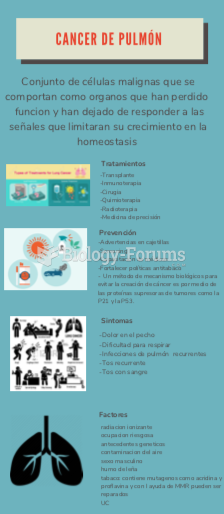|
|
|
The calories found in one piece of cherry cheesecake could light a 60-watt light bulb for 1.5 hours.
A strange skin disease referred to as Morgellons has occurred in the southern United States and in California. Symptoms include slowly healing sores, joint pain, persistent fatigue, and a sensation of things crawling through the skin. Another symptom is strange-looking, threadlike extrusions coming out of the skin.
The highest suicide rate in the United States is among people ages 65 years and older. Almost 15% of people in this age group commit suicide every year.
Interferon was scarce and expensive until 1980, when the interferon gene was inserted into bacteria using recombinant DNA technology, allowing for mass cultivation and purification from bacterial cultures.
The top five reasons that children stay home from school are as follows: colds, stomach flu (gastroenteritis), ear infection (otitis media), pink eye (conjunctivitis), and sore throat.
 The tone of the nurse-patient introduction sets the stage for the patient interview and patient care
The tone of the nurse-patient introduction sets the stage for the patient interview and patient care
 Cirrhosis. Cirrhosis is characterized by a chronic deterioration of the liver, replacing healthy cel
Cirrhosis. Cirrhosis is characterized by a chronic deterioration of the liver, replacing healthy cel
 Effective listening skills demonstrate empathy to the patient and break down barriers to communicati
Effective listening skills demonstrate empathy to the patient and break down barriers to communicati




